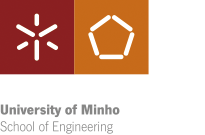Description
The Degree in Aerospace Engineering aims to train professionals linked to aerospace engineering, including the most traditional aeronautics sector (Profile A) and the most modern space sector (Profile B). In the tradition of UMinho's engineering training, a solid education in fundamental and engineering sciences is proposed, combined with a spectrum of speciality sciences, training technicians at a higher level, capable of performing project, research, development and management functions of aerospace systems. The strength of the training offer is based on solid and consistent training in the sciences of mathematics, physics, mechanics, materials, electronics and information technology, seeking to empower graduates with greater flexibility of skills. In particular, the Degree in Aerospace Engineering aims to train graduates who contribute not only but also to the consolidation of the national and European aerospace sector.
Key learning outcomes
1. Use information systems for communication, acquisition and processing of data and scientific calculation;
2. Develop projects integrating technical, economic, environmental and social responsibility aspects, using digital approaches appropriate to problems in the aerospace sector;
3. Conduct studies and projects, prototyping and audits in the Aerospace sector;
4. Integrate sustainable development practices in the innovation of products and equipment with aerospace applications with strong incorporation of sustainable materials and with less environmental impact;
5. Solve problems through an experimental approach to the aerospace sector, integrating multidisciplinary knowledge and technical and human components;
6. Lead multidisciplinary work teams;
7. Evidence of self-learning, communication and application of acquired knowledge, decision-making in aerospace-related problems, and adequate reasoning under relevant technological, social and ethical aspects.
Access to higher education
This course provides the technical-scientific capacity to access 2nd cycle courses (masters).
Careers
The School of Engineering currently has the 1st and 2nd cycles of continuity, that is, 2nd cycles that complement the 1st cycles, and with the same designation, as provided for in this Aerospace Engineering course. In these continuity cycles, the School of Engineering intends to carry out a complete training cycle that involves the 2 cycles. Therefore, and even if there is some pressure in the job market to hire graduates in aerospace engineering, it is expected that most of our students will apply for a master's degree after completing their degree. A benchmarking exercise allowed us to conclude that the masters of the only educational institution who have already graduated in Aerospace Engineering are faced, at the conclusion of their study cycle, with a market in the area that offers a greater number of places for these professionals than those who the institution was able to train, thus resulting in full employment. These alumni have found employment in Portugal and abroad, in the aeronautical and space sector, but also outside of it. Considering employers that operate solely in the sector: - In Portugal, employers include NAV, Portuguese Air Force, OGMA/EMBRAER, INAC, TAP and several new advanced technology companies. - Overseas employers have been CERN, Rolls-Royce, Airbus, British Aerospace, CASA, Safran, CERN, ESA and Eurocontrol are identified as some international employers.

